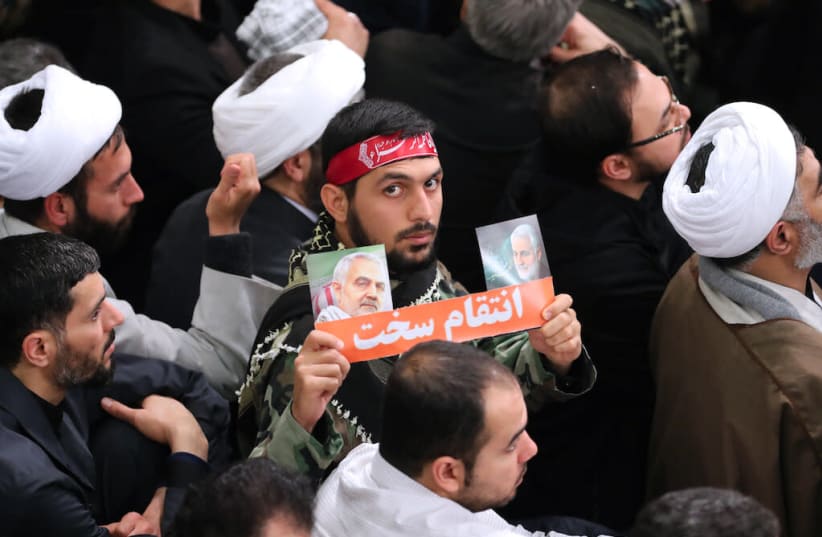As US President Donald Trump announced that Iran appeared to be "standing down," Iranian officials and Iran-backed Iraqi militias warned that further "revenge" attacks would be carried out in the near future in response to the US assassination of former Iranian Revolutionary Guards Corps Quds Force commander Qasem Soleimani.Amir Ali Hajizadeh, the commander of the IRGC's Aerospace Force, warned that the Iranian missile attack on US forces in Iraq on Tuesday night was just the beginning of a major operation named "Operation Martyr Soleimani" that would "continue throughout the region," according to the Iranian Fars news."We did not seek to kill. We sought to hit the enemy military machine," said Hajizadeh, adding that the IRGC was prepared to fire hundreds of missiles. The "cost of the blood" of Soleimani and the others killed in the US drone strike is the complete deportation of US forces, according to the commander.
An official of the Iran-backed Asa'ib Ahl al-Haq militia stressed that the Iraqi militias still haven't carried out their response to the assassination and that the coming response will be "very harsh," according to KAN News.
The official, Jawad al-Tulaibawi, added that the militias had not carried out the rocket attacks on Wednesday night that struck Baghdad's Green Zone near where the US embassy is located. He called the claims "shameful."On Wednesday, Qais Khazali, the head of Asa'ib Ahl al-Haq, tweeted that it was now Iraq's turn to respond the assassination of Popular Mobilization Forces commander Abu Mahdi al-Muhandis. "Iraqis are brave and their response will not be less than that of Iran – that is a promise," wrote Khazali, according to the Iranian Mehr news.Muhandis and Soleimani were killed along with 10 other people on Friday.US Vice President Mike Pence told Fox News that even if further attacks are carried out by Iran-backed militias, not Iran itself, the US will still respond, as evidenced by the fact that the rocket attacks that killed an American contractor and led to the decision to assassinate Soleimani were carried out by a militia, not Iranian forces.
A spokesman for the Iranian Armed Forces Brigadier General Abolfazi Shekarchi stated on Thursday that "Iran will take revenge on the US beyond the military operations," echoing remarks by Supreme Leader Ayatollah Ali Khamenei issued soon after the Iranian missile attack on US bases in Iraq on Tuesday night, saying that "military actions are not enough."
The second-in-command of the IRGC's Ground Force, Brigadier General Abdollah Araqi, warned that Iran would "inflict a more severe revenge on the enemy in the near future," according to the Iranian Tasnim news agency.
Araqi added that the assassination of Soleimani has "united the entire Islamic world and the resistance front."
The comments reflected statements made by Iran's Supreme Leader Ayatollah Ali Khamenei on Wednesday, claiming that the missile attack on US bases was just "a slap."
"The matter of revenge is another thing," said Khamenei in reference to the missile attack, according to his official website. "They were slapped last night, but such military actions are not enough in countering them. The corruptive presence of the US in the West Asian region must be stopped."
Khamenei stressed that the enemies are the US, Israel and a number of companies and individuals he called the "System of Arrogance."
IRGC commander Sayyid Yahya "Rahim" Safavi blamed the assassination on the Mossad and the CIA, according to Tasnim news.Brig.-Gen. (Res.) Itai Brun, a deputy director of the Institute for National Security Studies, told Army Radio on Thursday that he believes that Iran wants to shut down the current situation, but that revenge attacks would be carried out in the future. Brun stressed that the missile attack on Tuesday night reflected new abilities of the Iranians that were also shown in the attack on the Saudi Aramco oil facility, and that this could mean that Iran would pursue a large hit on critical infrastructure in a possible future conflict with Israel, instead of a prolonged fight.Iran launched more than a dozen ballistic missiles and targeted US bases in Iraq on Tuesday night in retaliation for the US assassination of Soleimani.
